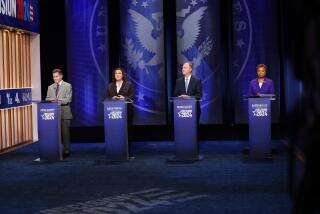ELECTION / 24TH CONGRESSIONAL DISTRICT : Beilenson and McClintock Split on Issue of Health Care
- Share via
Democrat Anthony Beilenson and Republican Tom McClintock locked horns over national health care Saturday, with Beilenson arguing that a government-financed system would bring down costs and provide access to all Americans and McClintock saying medical care should not be planned by “the same folks who gave you the Department of Motor Vehicles, the post office and the IRS.”
Beilenson said the United States should develop a health-care system modeled on Canada’s, with costs borne by taxpayers and a national medical care budget set by the government. But McClintock attacked the Canadian system, saying it has produced lengthy waiting lists for major surgery and that wealthier Canadians are fleeing south for treatment at U.S. hospitals.
Beilenson, a liberal Los Angeles congressman, and McClintock, a conservative state assemblyman from Thousand Oaks, debated for 90 minutes before members of the American Assn. of Retired Persons, which favors government-subsidized universal health care. The event, held at a Van Nuys junior high school, attracted about 125 people.
Beilenson is battling McClintock in the 24th Congressional District, which runs from Sherman Oaks to Malibu and Thousand Oaks. The race has drawn attention because of the dramatic ideological differences between the two men, who are appearing in at least nine debates and question-and-answer forums before Election Day--an unusually large number.
Besides health care, the contenders clashed over defense spending and gays in the military.
As they have in previous debates, Beilenson and McClintock stuck to the issues and avoided personal attacks. Sitting next to each other on a school stage, they sounded more like professors of government jousting at a college symposium than political foes battling in a high-stakes race.
A third candidate, Peace and Freedom Party member John Paul Lindblad, was not invited, but roamed the auditorium talking to audience members individually.
Responding to a central concern of the retired persons association, Beilenson said although a government health care system would be supported by taxes, it would reduce health care costs for 95% of all Americans by eliminating private bills for doctors, drugs and hospitalization.
McClintock countered that any government-financed system would be inefficient, and outlined problems in the Canadian system to back up his thesis.
Quoting an article in a Canadian newsmagazine, he cited the case of a 63-year-old Canadian man who was told he might die unless he received heart bypass surgery.
The surgery was postponed 11 times because of a bed shortage in a Toronto hospital, McClintock said. At one point, he said, the man waited in the hospital for 13 days before being discharged without the operation.
The procedure finally occurred, but the man’s family said that because of the delays, he “became a broken man who lost his will to live. He died eight days after the surgery,” said McClintock. “That’s not my vision for America,” he added.
Beilenson dismissed the story as “anecdotal evidence” spread by Canadian doctors and hospitals to discredit national health care. “Most of my Canadian friends enjoy the system and speak well of it,” he said.
Beilenson cited a recent book by Consumers Union that said the American health-care system is marked by high costs and unnecessary treatment while Canada’s “provided high quality, prompt treatment and relatively low out-of-pocket costs” for residents.
“You can either believe my hard right-wing friend over here to tell you what’s going on in Canada, or you can believe ‘Consumer Reports,’ ” he said.
On defense spending, the contenders agreed that U.S. overseas troop levels should be substantially reduced to reflect the end of the Cold War. But they disagreed sharply about spending on high-tech weapons systems, such as the B-2 bomber and “Star Wars” anti-missile system.
Beilenson said he “voted against virtually every defense budget I’ve had the chance to vote on,” saying they were rife with “waste and redundancy.” He said he consistently opposed Star Wars and the B-2, which costs $2 billion per plane.
“I don’t care if the airplane could fly circles in this room,” he said. “It isn’t worth $2 billion.”
McClintock attacked his rival for voting against the Gulf War, calling the government of Iraqi leader Saddam Hussein the “clearest, most expansionist tyranny in the past decade.”
The assemblyman also criticized Beilenson for voting against appropriations for the Bradley Fighting Vehicle and Star Wars, saying the Patriot missile--which performed so effectively in the Gulf War--was developed as part of the Star Wars program.
“I don’t think the troops which we had to send to the Persian Gulf would agree that all of these systems should be eliminated,” he said. “Those are systems that kept our casualties to a miraculous low.”
The candidates also disagreed on whether homosexuals should be allowed in the military. Beilenson said they should, but McClintock said he objects to the military being used “as an experimental lab for testing social theories.”
The men split again on whether women should be allowed in combat, McClintock saying the issue should be decided by the military, Beilenson saying he reluctantly favors women at the front lines.
“We should give them that choice, even though at times perhaps it’s uncomfortable and difficult for those of us who want to be--if I may say this without offending the women here--more protective of them, as we were brought up to be,” Beilenson said.
More to Read
Get the L.A. Times Politics newsletter
Deeply reported insights into legislation, politics and policy from Sacramento, Washington and beyond. In your inbox twice per week.
You may occasionally receive promotional content from the Los Angeles Times.










